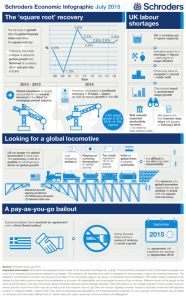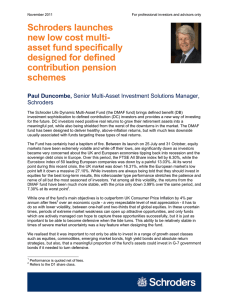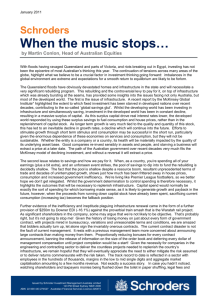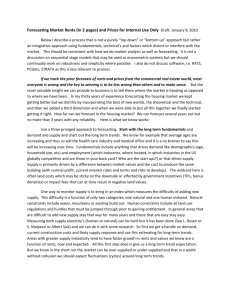West End of London Office Property Market Outlook Mark Callender,
advertisement
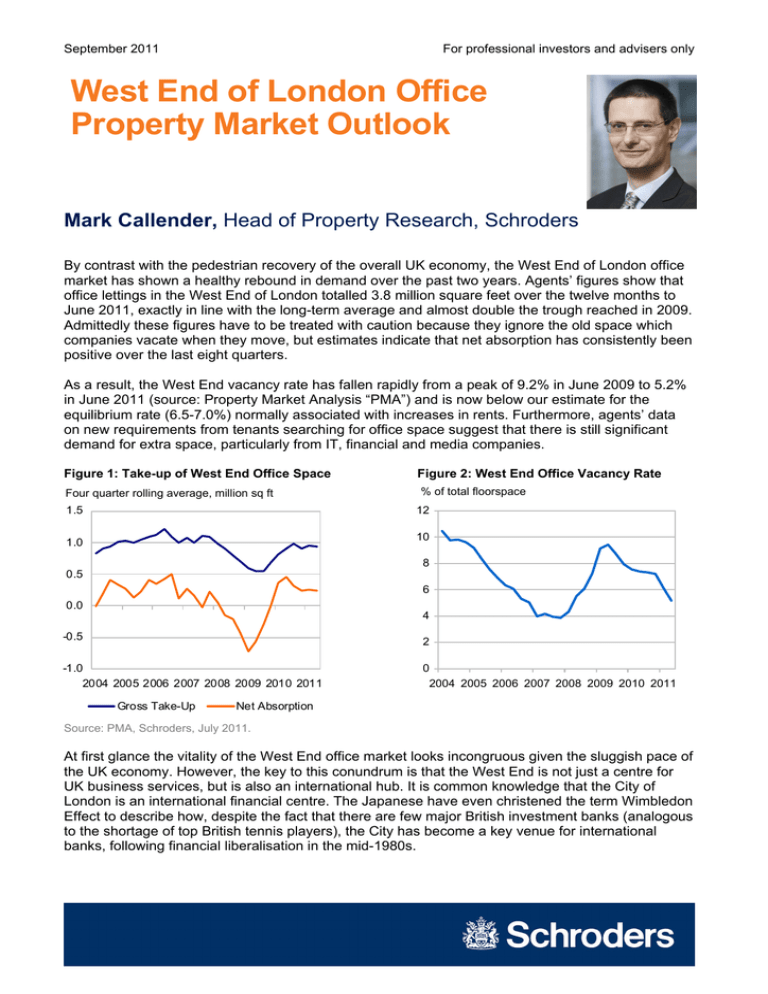
September 2011 For professional investors and advisers only West End of London Office Property Market Outlook Mark Callender, Head of Property Research, Schroders By contrast with the pedestrian recovery of the overall UK economy, the West End of London office market has shown a healthy rebound in demand over the past two years. Agents’ figures show that office lettings in the West End of London totalled 3.8 million square feet over the twelve months to June 2011, exactly in line with the long-term average and almost double the trough reached in 2009. Admittedly these figures have to be treated with caution because they ignore the old space which companies vacate when they move, but estimates indicate that net absorption has consistently been positive over the last eight quarters. As a result, the West End vacancy rate has fallen rapidly from a peak of 9.2% in June 2009 to 5.2% in June 2011 (source: Property Market Analysis “PMA”) and is now below our estimate for the equilibrium rate (6.5-7.0%) normally associated with increases in rents. Furthermore, agents’ data on new requirements from tenants searching for office space suggest that there is still significant demand for extra space, particularly from IT, financial and media companies. Figure 1: Take-up of West End Office Space Four quarter rolling average, million sq ft 1.5 Figure 2: West End Office Vacancy Rate % of total floorspace 12 10 1.0 8 0.5 6 0.0 4 -0.5 2 -1.0 2004 2005 2006 2007 2008 2009 2010 2011 0 2004 2005 2006 2007 2008 2009 2010 2011 Gross Take-Up Net Absorption Source: PMA, Schroders, July 2011. At first glance the vitality of the West End office market looks incongruous given the sluggish pace of the UK economy. However, the key to this conundrum is that the West End is not just a centre for UK business services, but is also an international hub. It is common knowledge that the City of London is an international financial centre. The Japanese have even christened the term Wimbledon Effect to describe how, despite the fact that there are few major British investment banks (analogous to the shortage of top British tennis players), the City has become a key venue for international banks, following financial liberalisation in the mid-1980s. West End of London Office Property Market Outlook For professional investors and advisers only However, what is sometimes forgotten is that both the City and West End are also major centres for international professional and business services. One circumstantial piece of evidence is that foreign owned companies accounted for 50-55% of gross take-up in the City and 30% in the West End in 2009-2010 (source: PMA). By comparison, foreign owned companies typically account for 10-15% of office lettings in Paris and New York. Moreover, a large proportion of the work done by large UK professional and business service companies is international and co-ordinated from London. For example, Allen & Overy reported that half of their legal work in 2010 involved three, or more of their offices. The international importance of London is further underlined by an analysis undertaken by the Globalisation and World Cities (GaWC) Research Network of universities. The study of 175 international financial and business services companies looks not only at where they are located, but also at the importance of each office in terms of whether it is a global HQ, regional HQ, national office, local representative office, etc and how they allocate work internally across their offices. The 175 companies have offices in 525 cities and for each city the researchers multiplied the number of offices by their importance to arrive at a total connectivity score, indicating the capacity of the city to undertake international work. Table 1: Top Five most connected European cities in each sector Accountancy Advertising Finance Law Management Consultancy London London London London London Milan Paris Paris Paris Paris Paris Warsaw Madrid Frankfurt Zurich Brussels Brussels Milan Brussels Madrid Lisbon Athens Frankfurt Amsterdam Rome Source: Global Urban Analysis by Peter J. Taylor et al. 2011 As the table reveals, London is a major international hub not only for finance, but also for accountancy, advertising, law and management consultancy and it consistently ranks above other European cities such as Paris, Frankfurt or Brussels. Business services firms in the City and West End of London are benefiting in particular from the growing reliance of multi-national companies on outsourced services and from the entry of those companies into new markets in central and eastern Europe. The growth in international business services has probably been the main driver behind the decline in vacancy in the West End office market over the last two years. However, perhaps counterintuitively, another contributory factor has been an increase in the redevelopment of obsolete offices which were previously empty. We estimate that the upturn in redevelopment has reduced the West End vacancy rate by 0.5% since 2009. While these schemes will of course return to the market in 2012-2014, the increase in the total amount of office space in the West End will be limited to less than 1% between end-2010 and end-2015 (source: PMA). By contrast, in the City, where there are fewer planning restrictions on high-rise development, the total amount of office space is forecast to increase by 4% over the five years to end-2015. Predictably, the fall in the West End office vacancy rate to below its equilibrium rate has led to an early recovery in rents. The highest headline rents achieved on suites in the West End are now in excess of £100 per square foot and according to Strutt & Parker prime rents rose to £92.50 per square foot in June 2011, from a trough of £80.00 per square foot at the end of 2009. 2 West End of London Office Property Market Outlook For professional investors and advisers only Admittedly, prime rents only refer to a very rarefied part of the market, but figures from IPD based upon a broad mix of properties, also show a definite recovery, with average office rents in the West End increasing by 8% over the twelve months to June 2011. Looking forward, we would not be surprised if the recent turmoil in financial markets prompted some tenants to put new lettings on hold and if the remainder of 2011 saw a pause in rental growth. Schroders’ central economic view is that the drama in financial markets will not of itself trigger a recession and we expect that the UK and other developed economies will see slow growth through 2012 and 2013. This is based on the main drivers of rising exports to emerging economies and higher business investment. Consequently, we believe that any hiatus in lettings in the second half of 2011 should prove to be temporary and that next year will see the start of a sustained improvement in tenant demand, which will push up prime and average office rents by 20-25% between end-2011 and end-2014. In nominal terms that would take prime office rents in the West End back to their previous peak of £120 per square foot, although in real terms adjusted for inflation, they would still be around 20% lower. Figure 3: West End Office Rents Prime rent, £ per sq ft Average rent, £ per sq 130 60 Forecast 120 55 110 50 100 45 90 40 80 35 70 30 60 25 50 20 2000 2002 2004 2006 Prime 2008 2010 2012 2014 Average (rhs axis) Source: IPD, Schroders, Strutt & Parker. August 2011 Note: The forecast should be regarded as illustrative of trends. Actual figures will differ from forecasts. Unfortunately, of course, we cannot rule out the possibility of a double-dip recession in the UK and other developed economies, particularly if the Eurozone fractures. In that eventuality, tenant demand would fall sharply and we could then see a new downswing in West End office rents, particularly if the vacancy rate jumped back above 7%. Another more specific threat to the West End is that cuts in government spending could lead to sharp fall in the number of civil servants. The main concentration of government offices is in Victoria, but they are also an important part of the occupier base in Covent Garden and St James and in total the West End accommodates around 75,000 civil servants. Our forecast assumes that the number of civil servants working in the West End falls by around 15,000 over the next 3-4 years and that the drop is more than offset by between 25-30,000 new jobs in business services. However, there is a risk that the government decides to accelerate the relocation of departments to cheaper, more modern offices outside London and the cut in civil service staff in the West End is deeper than anticipated. 3 West End of London Office Property Market Outlook For professional investors and advisers only Switching to the investment market, the last 18 months have seen a good level of liquidity. The total value of West End office deals rose to £5.0 billion in 2010, from just £2.8 billion in 2009 and there was a further £2.3 billion of investment transactions in the first half of 2011 (source: JLL). Smaller lot sizes below £15 million are dominated by foreign private investors who regard the West End as a safe haven and initial yields on smaller prime offices were around 4.0% at the end of June 2011. The main investors in larger West End offices are UK and foreign institutions and UK property companies and initial yields on bigger lot sizes ranged between 4.5% on prime assets to 6.0% on secondary offices at the end of June. Anecdotal evidence suggests that the recent turmoil in financial markets may have caused some transactions to unravel. Considering the rest of 2011, we suspect that some investors will become more cautious and that those who had been willing to move up the risk curve and buy refurbishment projects and properties with shorter leases may now re-focus on lower risk opportunities. As a result, we anticipate that yields on secondary offices will probably increase by 0.25-0.5% over the next six months. This could create some interesting buying opportunities for better quality secondary assets if our central economic scenario is correct. By contrast, we anticipate that prime West End office yields are likely to hold steady and could even fall marginally, if the volatility in financial markets prompts a new influx of foreign private capital. Looking further ahead, we expect that West End office yields will remain fairly stable through 2012-2014, unless there is a major deterioration in prospects for the economy and future rental growth. In conclusion, we believe that the medium-term outlook for the West End office market is still relatively attractive. London is benefiting from strong growth in international business services and this should support a further significant upswing in West End office rents from 2012 onwards, assuming the UK and other developed economies continue to see slow growth. Moreover, if the worst were to happen and Europe fell back into recession, then the West End office market ought to be relatively well placed to weather the storm, given its current low vacancy rate and low future level of new development. 4 West End of London Office Property Market Outlook For professional investors and advisers only Important Information The views and opinions contained herein are those of Mark Callender, Head of Property Research at Schroders, and may not necessarily represent views expressed or reflected in other Schroders communications, strategies or funds. For professional investors and advisers only. This document is not suitable for retail clients. This document is intended to be for information purposes only and it is not intended as promotional material in any respect. The material is not intended as an offer or solicitation for the purchase or sale of any financial instrument. The material is not intended to provide, and should not be relied on for, accounting, legal or tax advice, or investment recommendations. Information herein is believed to be reliable but Schroder Investment Management Limited (Schroders) does not warrant its completeness or accuracy. No responsibility can be accepted for errors of fact or opinion. This does not exclude or restrict any duty or liability that Schroders has to its customers under the Financial Services and Markets Act 2000 (as amended from time to time) or any other regulatory system. Schroders has expressed its own views and opinions in this document and these may change. Reliance should not be placed on the views and information in the document when taking individual investment and/or strategic decisions. Any forecasts in this document should not be relied upon, are not guaranteed and are provided only as at the date of issue. Our forecasts are based on our own assumptions which may change. We accept no responsibility for any errors of fact or opinion and assume no obligation to provide you with any changes to our assumptions or forecasts. Forecasts and assumptions may be affected by external economic or other factors. Issued by Schroder Property Investment Management Limited, 31 Gresham Street, London EC2V 7QA. Registration No. 1188240 England. Authorised and regulated by the Financial Services Authority. For your security, communications may be taped or monitored. 5

